- Home
- Neal Asher
The Skinner Page 15
The Skinner Read online
Page 15
He was about to shout out again when he suddenly realized he was utterly alone on the beach.
‘Shit,’ he said, and gazed down at the two green lights on the cleanser.
REPEAT ERROR MESSAGE, he instructed.
OUTSIDE PARAM FUNCTION: CEREBRAL PROBE ERROR.
In his organic brain – cross-referenced to AI emotional emulation – he got in the nearest he could get to a cold sweat.
DETAIL.
The reply did nothing to ease that feeling.
Capillary blockage to organic cerebrum/Agglutinate balm/A1 viral fibre/Ox-3 starvation.
PRESENT DETAIL.
NOMINAL.
That made him feel no better. Cradling the cleansing unit while it continued labouring to clear his fouled balm, he returned to his scooter and slumped down with his back against it. He’d just come as close as it was possible, for a walking corpse, to having a stroke.
Underneath accreted layers of time, perversion, and monstrous deed after monstrous deed, there lay an earlier self that Frisk knew would be horrified at what she had since become. She even found a certain perverse pleasure in that fact – more pleasure than she was extracting in this present pursuit.
The ancient Prador to whom Ebulan himself had been first-child during the Prador/Humanwar,had maintained that human flesh gained added piquancy from extended suffering. So it was that humans force-grown for meat began to be slaughtered by slow and excruciating factory processes. When they had fled to the Prador Third Kingdom, she and Jay had found satisfaction of their perverse instincts in the holding pens and slaughterhouses there, but only some. For force-grown humans did not have time to acquire the life experience to truly appreciate the horror of their situation.
In later years, after Jay had departed, Frisk had continued to find satisfaction there, but it had decreased as eating human meat had become less fashionable amongst Prador kind. With fewer and fewer force-grown humans available, sometimes years might pass between each sado-sexual release for her. She had tried human blanks before, but always been frustrated.
And thus it was now. The blank, of course, remained utterly indifferent to the things she was doing to him. She realized this was a pointless exercise, but could not restrain herself from carrying it through to the end. Under instruction from his thrall unit, he grew an erection and pumped away at her while she cut and burned him. But because he was also ancient Hooper, the burns quickly scabbed and slewed away, and his skin closed back over the wounds she made like a layer of oil over water, his expression changing not one whit as she inflicted this abuse on him. In the end she grew bored and frustrated at his passivity, and pushed him away. How she wished things were still as they had once been.
‘Move back to the door,’ she instructed.
The blank pushed himself off her and stepped back as instructed. Lying back, she remembered the games she and Jay had once played: the screams of both agony and ecstasy ringing through the pens, the quintessential pleasure of watching some favourite plaything coming to realize that he or she was no longer favoured, and faced only a future of agony and death, then consumption by the Prador. She remembered how, with the correct drugs and techniques, they could extend such an individual’s life for days – even after removing their entire skin. Heady days, now gone for ever.
‘Leave me,’ she instructed the blank, and turned over on to her stomach as the door closed behind him.
Of course, now she was coming back into human-habited space, there would be a surplus of material for her delectation. Most of them would be Hoopers, true, but they would be Hoopers with minds, and even though durable, they could still be made to suffer – it was all a matter of technique. She understood herself well enough to know that her imminent return to the scene of her most ghastly crimes was not really about Jay or Keech – it was about boredom and need.
Feeling movement on her leg Frisk rolled over and batted away one of the many lice that occupied the ship. As she donned her environment suit, she tried to imagine a future where she could continue to let loose the full extent of her malice and have it responded to. She tried to relish the prospect, but imagination had become dull, and interest lacking. In this she found another source of anger.
Standing up, she said, ‘I will just have to work at it.’ But the words seemed to be sucked away by the coldness of the ship surrounding her.
‘I will work at it,’ she said, and smashed her foot down on the louse, crunching it into the floor.
7
The cloud of disturbed silt, broken shell, gobbets of flesh and yellowish chyme now covered five square kilometres of seabed, and when one edge reached the oceanic trench it waterfalled into the cerulean depths. On a good day for glisters, this waterfall would have descended upon certain entities down there and elicited only the waving of siphons like hollowed trees, the contemplative thump of a fleshy foot capable of tipping boulders to see what might be for lunch underneath, and the blink of a slot-pupilled eye the size of a dinner plate. Today was a bad day, however. The monstrous whelk – which had as its minuscule kin both the hammer and frog varieties, for it was into his kind that they tranformed upon surviving long enough to finally become sexually active – had not had a particularly good day himself, nor week either. For longer than had seemed fair, a deepwater flesh-eating heirodont had hunted him through the boulderfields that were his natural home below and, of necessity, he had escaped into the deep crevices found higher up the face of this underwater cliff. Below, encountering such tastes in the water would merely have whet his appetite for one of the huge filter-worms that lived underneath the boulders. Those worms were now far out of reach, and the source of this taste was very close. Rolling out masses of tentacles, with skin so thick and fibrous even leeches could not penetrate, he hauled himself up the face of the cliff and went to dine.
He was on the deck and prill were coming over the rail. There was no one else on board but something shadowy and insectile steered the ship down an avenue made in the sea by the reared trumpet mouths of giant leeches. He backed away from the prill but his fear was more of the leeches and the way their mouths were watching him. Too late he realized he had backed up against the mast and his fear twisted its knife in his gut. He looked up and the sail shrugged at the inevitability of it all before it dropped on him. He tried to run but just could not move fast enough. Sheets of pink-veined skin enfolded him and dragged him down. Only then did it occur to him how ridiculous this whole situation was and that he was dreaming. He woke with the twisting fear in his gut, turning to a gnawing hunger.
Janer opened his eyes and immediately sat upright. He looked at his bandaged hand and flexed it. It was stiff and slightly sore, but not half so painful as he expected.
‘How long?’ he asked.
‘You’ve missed a day and we are now halfway through a second,’ the mind replied.
‘I’ve got the virus in me.’
‘Five per cent of visitors here end up infected. The ones uninfected are those who take precautions. You took none, though you were advised at the runcible terminal and took the information pack on offer. Did you scan it?’
‘No,’ said Janer.
‘You wanted to end up infected,’ the mind stated.
‘Perhaps. Not consciously anyway. Fait accompli now. What are the disadvantages?’
‘There are few. If you spend sufficient time away from reinfection during your first century, the virus will die in your body, and as it breaks down, will cause most of your major organs to fail. Your sensitivity to pain will be greatly reduced, though some might not consider that a disadvantage. You’ll be more susceptible to certain fungal infections. There are three known diseases that would kill you in a protracted and painful way, whereas before you would have survived them . . . There is a long list and it is in the information pack you took.’
‘Advantages?’
‘Extreme resistance to injury. Gradual increase in physical strength. Higher resistance to other viruses – some of which would k
ill you, had you not had this virus. And, of course, reduced sensitivity to pain – if you consider that an advantage.’
Janer looked at the hornet squatting on the table by his bunk. Minds did not feel pain. How could something scattered between thousands of nests feel pain? How could a mind that once thought at the slow speed of pheromonal transfer understand physical injury?
‘Would you consider pain an advantage?’
‘I consider anything that increases my sensitivity to the world around me to be an advantage. The unit that is with you now died some time in the night, and all I experienced was the loss of sensory input from that world.’
Janer more closely inspected the hornet. He hadn’t realized. He prodded it with his finger and it went over on to its back with legs in the air like a pincushion.
‘What killed it?’ he asked.
‘The same thing you have been infected with,’ said the mind.
‘I thought you said these hornets had been altered.’
‘Two different alterations, one of which I predicted to have a low chance of success.’
‘I don’t get it,’ said Janer. ‘How was it infected? It couldn’t have been bitten.’
‘Insects, unlike humans, cannot avoid infection here. The viral spores which only take hold inside a human after a massive infusion – like through a leech bite – can enter insects through their breathing spiracles,’ was the mind’s sarcastic response.
‘I thought the virus didn’t survive for long outside of a body.’
‘It doesn’t. The spores can enter when the insect feeds on something infected. They can even enter when it lands on something infected, or even flies past it. In the case of insects it only takes a few viable spores for the virus to be established.’
‘Why? Why so different from humans?’
‘Obviously we are the more primitive life form,’ said the mind.
‘Oh, you poor thing, you,’ said Janer.
‘Of course,’ said the mind. ‘I meant physically, not intellectually.’
‘Yes, of course,’ said Janer. He slid his feet from under the cover and sat on the side of the bunk. He removed the dressing from his hand and looked at the ugly wound in which it seemed a blue ring had been tattooed. He was a Hooper now. He had the mark.
‘What do you want to do with . . . this lost sensory input?’ he asked, pressing the dressing back into place.
‘Return it,’ said the mind. ‘There is still much to learn about this virus and its effect on hymenoptera physiology.’
Janer reached under his bunk and pulled out his backpack. From this he removed a two-pack of brushed aluminium cylinders. Each cylinder was ten centimetres long and three in diameter. One end was rounded and the other end was a spike. He took one cylinder out of the plastic wrapping, pressed his fingernail into an indentation, and a small door flipped open. He used the plastic wrapping to pick up the dead hornet and drop it inside the cylinder. His years of being indentured, and the two decades thereafter, had enabled him to tolerate the presence of these insects but had not relieved him of his fear of actually touching them. He closed the lid and stood. Then he went out on to the deck.
The signal bell from the scooter comunit was chiming, but Keech ignored it as he waited for the last lights to change to green on the cleanser. Shortly after the chiming ceased, he got a message through the audio input from his aug.
‘Message for Sable Keech,’ it said.
‘What now?’ he asked.
‘Link requested from Hive transponder.’
Keech glanced back at the hexagonal box in the scooter’s luggage compartment. He’d almost forgotten about that.
‘Permission for link granted,’ he said.
First came the buzzing, and then the Hive mind came online.
‘Do you have the package?’
Keech replied, ‘I have the package, but I won’t be taking it to Janer just yet.’
The buzzing took on an angry tone. ‘We had an agreement,’ said the Hive mind.
Keech watched the last red light change to green, then detached the cleanser and carefully pushed the tubes back into place.
‘We had an agreement,’ the Hive mind repeated.
‘The agreement is off. I need to return to Coram and make use of the medical facilities there.’
‘You have a problem?’ the mind asked, injecting ersatz concern into its voice.
‘I have a problem,’ Keech said.
‘What kind of problem?’ asked the mind.
‘At a stretch, you could call it a medical one,’ replied Keech
‘Erlin Tazer Three Indomial is with Janer. Perhaps she could help you. I believe she travels nowhere without an extensive collection of medical and pathological research equipment.’
‘So nice of you to be thinking of me,’ said Keech, bracing his hand against the scooter and standing up.
‘Was that sarcasm or irony?’ asked the mind.
‘Probably both,’ said Keech, dropping the cleanser into the back of the scooter.
‘I’m never sure which is which,’ said the mind.
Keech stared at the scooter, trying to decide if he should risk flying to the Dome. His vision was still tunnelling and there were odd squares flicking up in the visual field fed from his aug. A hissing crack interrupted his decision-making process. Automatically he ducked down, only to stoop into a cloud of smoke that had gouted from his own kneecap.
‘You’re not going anywhere, reif!’ someone shouted.
For one long horrible moment Keech could not decide if this was reality or not. The two Batians who came striding out of the dingle at the head of the beach were like so many others he had seen and killed over the years. Then, to his horror he realized he had forgotten seeing these people earlier at the shuttle port. He tried to dispel anxieties about what this failing memory could mean, as he had more exigent concerns: two Batians here – with, no doubt, the other three not far behind.
‘You know, you’ve made our job so very easy,’ spat the man of this pair.
Keech said nothing. He gazed at the woman as she kept her laser carbine centred on him. The man holstered his weapon with a kind of casual contempt. It was the mistake they had always made. They were so very confident in their ability to kill. Weren’t they such good shots? But then it was like fire and ash: fire will not burn something that has already been burned.
‘Who sent you?’ Keech asked, as he had asked many times before.
The man smiled nastily and gave no answer – as before. Keech nodded and drew his pulse-gun from his belt holster.
‘Drop it!’ shouted the woman with the carbine.
Keech raised his weapon and carefully aimed it. Laser shots punched smoking holes through his chest and through his stomach, but did not spoil his aim. He fired once: a black hole appeared in the woman’s forehead, and the back of her skull turned into a blooming cloud behind her. As she staggered back and went over, Keech turned and mounted his scooter. The man just watched this in stunned horror, before thinking to reach again for his own weapon.
‘You forget, I’m already dead,’ said Keech, before slamming his scooter up into the sky.
A wind was blasting the ship along at a good rate of knots, and spray was coming up over the bow. Erlin watched Janer come up on to the deck and gaze about in surprise.
‘Got his sea legs, then,’ said Captain Ron.
Erlin turned and searched for a trace of irony in Ron’s expression, and found none. She returned her attention to Janer as he walked to the rail and tossed something silvery over the side. The silvery object fell in an arc but, before it hit the waves, it corrected and shot off under its own power. Captain Ron grunted in surprise and, when Erlin turned to him, he seemed embarrassed.
‘Message carrier,’ he said, nodding toward the receding object. ‘Used to send ’em in the war.’
‘What war?’ Erlin asked.
‘Prador,’ explained Ron tersely.
‘Oh.’
Erlin looke
d away from him as she absorbed that. Ron was nearly as old as Ambel, and it was well to be reminded of this fact. It became too easy to view the likes of Ron and Ambel as relatively normal. Their apparent simplicity was deceptive, as the Old Captains had centuries of experience, and probably had forgotten more than she had learnt in her mere span of two hundred and forty years. She had actually forgotten that most Old Captains fell into an age range in the upper half of a thousand years. Senior seamen came in at the lower half. Herself? . . . she qualified as a senior, but only that. How easy it was to forget the way things were here. Those of the crew classified as juniors, and whom the likes of Ambel referred to as ‘lads’, were often over a century old. She wondered then how Ambel viewed her. Was she a child to him? Had the anger she had felt at his seeming complacency been seen by him as a childish fit of pique? What – when she found him – would be his reaction to her? Stupid child, she told herself as she watched Janer approach.
‘What message?’ asked Ron.
‘No message,’ said Janer as he climbed up on to the cabin-deck. ‘Just a dead hornet going home.’
‘Told you the fibres clog ’em,’ said Ron.
‘Apparently so,’ admitted Janer. ‘Where are we going?’
Erlin replied, ‘Captain Drum sighted the Treader heading out for the feeding grounds. We’re going after it.’
‘What feeds there?’
‘Leeches – big ones.’
Janer nodded his acknowledgement and grimaced at the scar on his hand.
Erlin turned to Ron again. ‘Ambel said he came here after the war. In all the time I was with him I never questioned that, but I do now wonder if he was telling the truth.’
‘Couldn’t say,’ he said. ‘I came here a century after it was all over, and didn’t meet him until a century after that.’
‘You came here a century after the war?’ Janer interjected.
Ron glanced at him. ‘I was getting old and the geriatric treatments in the Polity weren’t so good then. Seemed like a good idea at the time.’
Janer glanced at Erlin to see how she was responding to this – she with her opinion of people searching for ‘miracles’. Her expression gave nothing away so he returned his attention to Ron.

 The Bosch: A Novella (Polity Universe)
The Bosch: A Novella (Polity Universe)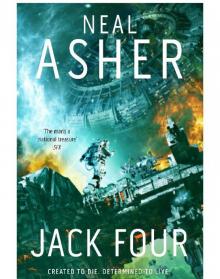 Jack Four
Jack Four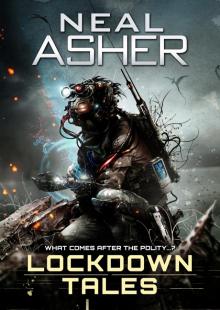 Lockdown Tales
Lockdown Tales The Warship
The Warship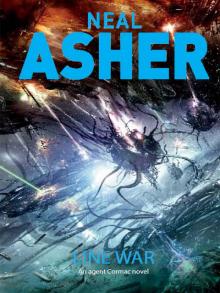 Line War
Line War Total Conflict
Total Conflict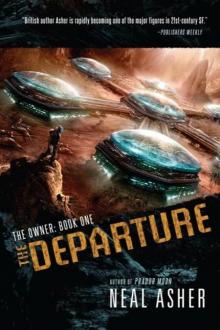 The Departure
The Departure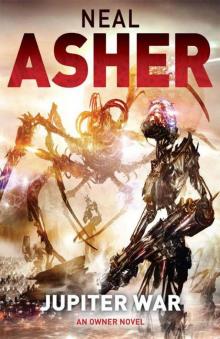 Owner 03 - Jupiter War
Owner 03 - Jupiter War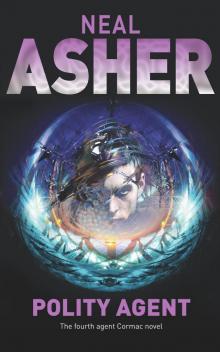 Polity Agent
Polity Agent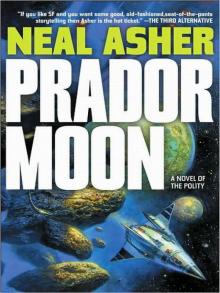 Prador Moon
Prador Moon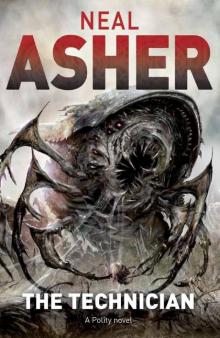 The Technician
The Technician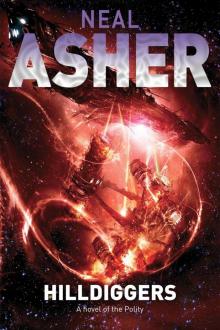 Hilldiggers
Hilldiggers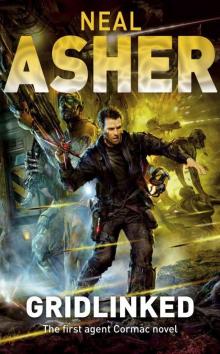 Gridlinked
Gridlinked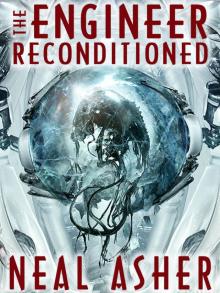 The Engineer ReConditioned
The Engineer ReConditioned Dark Intelligence
Dark Intelligence The Soldier: Rise of the Jain, Book One
The Soldier: Rise of the Jain, Book One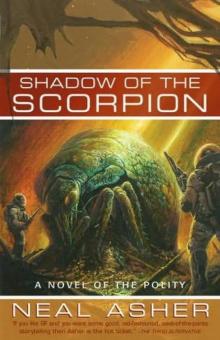 Shadow of the Scorpion p-2
Shadow of the Scorpion p-2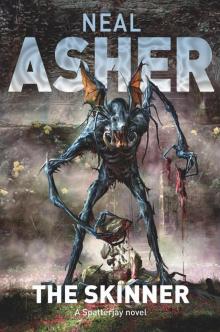 The Skinner
The Skinner The Soldier
The Soldier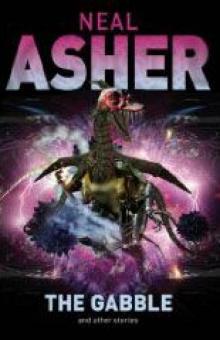 The Gabble p-13
The Gabble p-13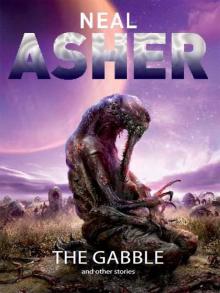 The Gabble and Other Stories
The Gabble and Other Stories The Parasite
The Parasite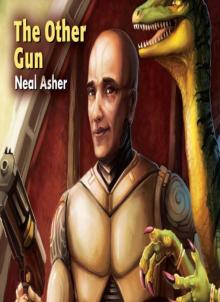 The Other Gun
The Other Gun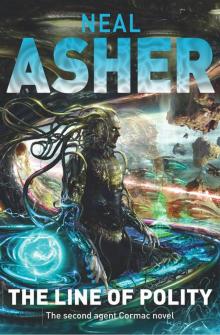 The Line of Polity
The Line of Polity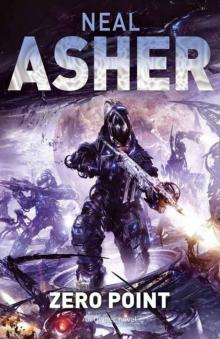 Zero Point (Owner Trilogy 2)
Zero Point (Owner Trilogy 2)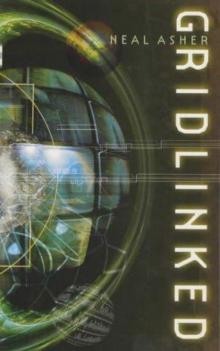 Gridlinked ac-1
Gridlinked ac-1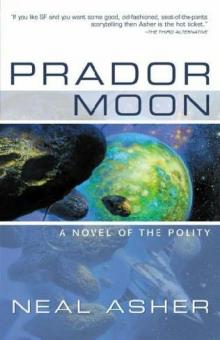 Prador Moon p-1
Prador Moon p-1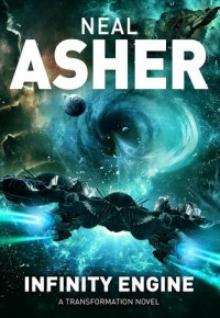 Infinity Engine
Infinity Engine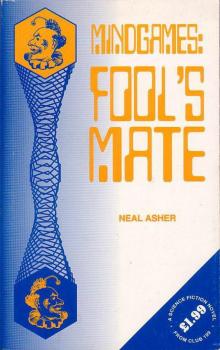 Mindgames: Fool's Mate
Mindgames: Fool's Mate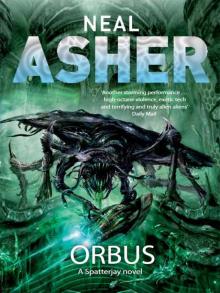 Orbus
Orbus Africa Zero
Africa Zero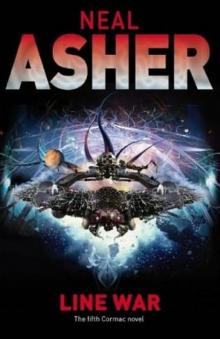 Line War ac-5
Line War ac-5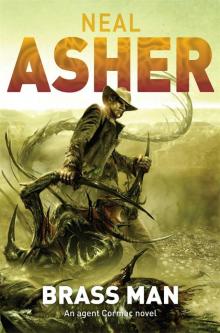 Brass Man
Brass Man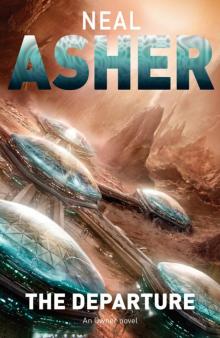 The Departure to-1
The Departure to-1 Cowl
Cowl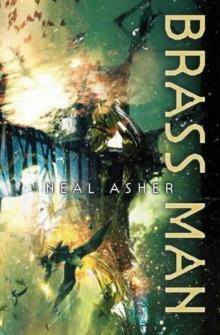 Brass Man ac-3
Brass Man ac-3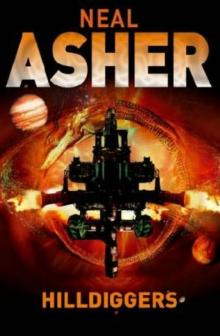 Hilldiggers (polity)
Hilldiggers (polity)![Greg Bear - [Eon Trilogy 1] - Eon (rescan) (v1.0) Read online](http://i1.bookreadfree.com/i2/04/08/greg_bear_-_eon_trilogy_1_-_eon_rescan_v1_0_preview.jpg) Greg Bear - [Eon Trilogy 1] - Eon (rescan) (v1.0)
Greg Bear - [Eon Trilogy 1] - Eon (rescan) (v1.0)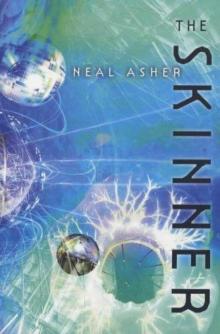 The Skinner s-1
The Skinner s-1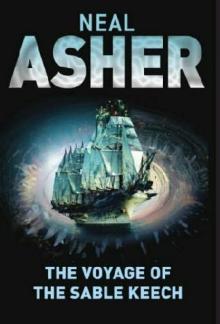 The Voyage of the Sable Keech s-2
The Voyage of the Sable Keech s-2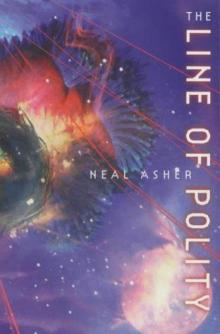 The Line of Polity ac-2
The Line of Polity ac-2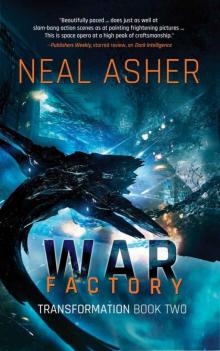 War Factory: Transformations Book Two
War Factory: Transformations Book Two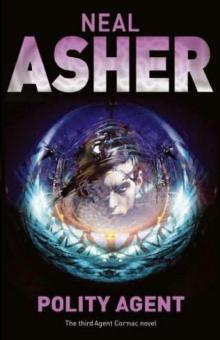 Polity Agent ac-4
Polity Agent ac-4